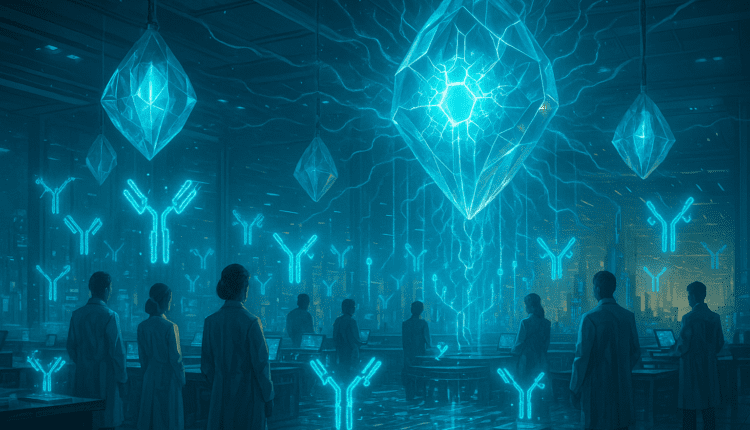AI Designs Antibodies from Scratch — A Scientific Breakthrough That Could Reshape Drug Discovery

Artificial intelligence has taken a decisive leap from theory to tangible scientific impact. In a landmark achievement, a research team led by a Nobel Prize–winning scientist has successfully used AI to design entirely new antibodies — molecules that precisely hit their intended biological targets. What once took years of lab work has now been accomplished in a matter of months, signaling a profound shift in how future drugs might be developed.
You can explore more technology and innovation updates in our Cryptocurrency News section, where AI’s influence on science, finance, and data systems continues to grow.
🧬 From AI Assistance to AI Creation
Online advertising service 1lx.online
This marks a major milestone in computational biology. While AI has already been used to analyze genetic data and model protein structures, this time it created viable therapeutic molecules — an autonomous design process once thought impossible without human-led biochemistry.
According to the research team, the AI system iteratively learned how to optimize the shape, charge, and binding properties of antibodies through millions of digital simulations. The result: antibodies that performed successfully in early laboratory tests, binding precisely to their targets with strong efficacy.
“We’re witnessing AI evolve from a tool to a genuine scientific partner,” the Nobel laureate said. “This approach could transform drug discovery timelines from decades to months.”
💡 Why This Breakthrough Matters
The implications of AI-designed antibodies extend far beyond medicine.
If validated at scale, this technique could reduce drug development costs by up to 80%, while opening doors to treatments for diseases once deemed “undruggable” — including certain cancers, autoimmune disorders, and rare genetic conditions.
Moreover, it demonstrates a broader principle relevant across industries — including finance and crypto: AI can now generate not just insights, but entire systems and structures.
Just as blockchain redefined trust and transparency in finance, AI is now redefining creation and innovation in science.
This technological convergence hints at a future where the boundaries between computation, biology, and economics blur — a vision that resonates deeply with the digital evolution explored across BTCNews.space.
⚙️ The Fusion of Science and Machine Intelligence
The research lab employed deep generative models — similar in principle to those used for text, art, and code — but trained exclusively on biochemical datasets.
Each AI model simulated billions of possible molecular combinations, testing their stability and binding potential through virtual screening before proposing real-world candidates.
Online advertising service 1lx.online
These AI-designed antibodies were then synthesized and tested in wet labs, where they successfully neutralized target proteins, confirming the algorithm’s predictive accuracy.
While still in early phases, the achievement opens a path toward:
- Rapid pandemic response capabilities (AI can design antibodies in days).
- Personalized therapeutics built for individual immune profiles.
- Integration with blockchain-based health data systems for transparency and traceability — a crossover that could align with future DeFi health funding models seen in Ethereum News.
“We’ve entered the era where AI is not just assisting science — it’s doing science,” said one senior bioinformatics engineer involved in the project.
🌍 Long-Term Outlook: AI as a Global Scientific Catalyst
Online advertising service 1lx.online
This milestone is part of a wider trend: AI-driven automation is entering fields long thought resistant to computation — law, economics, engineering, and now, molecular biology.
The ability of AI to model, test, and invent across these domains suggests an accelerating convergence between data-driven systems and biological intelligence.
For policy leaders and innovators, it raises both opportunity and responsibility.
Regulators will soon face the same dilemmas already familiar to crypto markets — how to ensure transparency, prevent misuse, and maintain human oversight in systems that evolve autonomously.
As Europe, the U.S., and Asia race to build AI governance frameworks, breakthroughs like this underscore why regulation must evolve alongside discovery — not after it.
Our creator. creates amazing NFT collections!
Support the editors - Bitcoin_Man (ETH) / Bitcoin_Man (TON)
Pi Network (Guide)is a new digital currency developed by Stanford PhDs with over 55 million participants worldwide. To get your Pi, follow this link https://minepi.com/Tsybko and use my username (Tsybko) as the invite code.
Binance: Use this link to sign up and get $100 free and 10% off your first months Binance Futures fees (Terms and Conditions).
Bitget: Use this link Use the Rewards Center and win up to 5027 USDT!(Review)
Bybit: Use this link (all possible discounts on commissions and bonuses up to $30,030 included) If you register through the application, then at the time of registration simply enter in the reference: WB8XZ4 - (manual)
